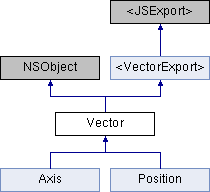|
EngineKit
|
|
EngineKit
|
#import <Vector.h>

Instance Methods | |
| (instancetype) | - initUniformWithNumber: |
| (instancetype) | - initWithX:Y:Z: |
| (instancetype) | - initWithSCNVector: |
| (instancetype) | - initWithSCNVector4: |
| (instancetype) | - initWithCIVector: |
| (instancetype) | - initWithVector: |
| (instancetype) | - initWithArray: |
| (instancetype) | - initWithObject: |
| (BOOL) | - isEqualToVector: |
| (SCNVector3) | - toSCNVector |
Class Methods | |
| (instancetype) | + origin |
Properties | |
| SCNVector3 | vector |
| CGFloat | x |
The Vector's x component. | |
| CGFloat | y |
The Vector's y component. | |
| CGFloat | z |
The Vector's z component. | |
 Properties inherited from <VectorExport> Properties inherited from <VectorExport> | |
| CGFloat | x |
| CGFloat | y |
| CGFloat | z |
Represents a tuple of three CGFloats, here named x, y and z.
| - (instancetype) initUniformWithNumber: | (CGFloat) | x |
Creates a Vector in which all components are set to x. Useful for uniform scales.
| x | The value to set to all the Vector's components. |
Reimplemented from <VectorExport>.
| - (instancetype) initWithArray: | (NSArray *) | array |
Creates a Vector based on the given NSArray. Trusts that the array has enough (3 or more) components, and that the first 3 components may be cast into NSNumbers.
| array | The array to copy into the Vector. |
Reimplemented from <VectorExport>.
| - (instancetype) initWithCIVector: | (CIVector *) | newValue |
Creates a Vector in which all components are set as just as the first 3 components (x, y and z) in the given CIVector. This method trusts that the CIVector has been correctly initialized and has the necessary components.
Useful for obtaining a Vector through a CIVector initialization method.
| newValue | The CIValue whose x, y and z components should be used. |
Reimplemented from <VectorExport>.
| - (instancetype) initWithObject: | (id) | object |
Creates a Vector based on the given object. The supported objects are:
-initUniformWithNumber.-initWithArray.-initWithSCNVector3.-initWithVector.assert(false) will be triggered.| object | An object of any one of the classes mentioned above. |
Reimplemented from <VectorExport>.
| - (instancetype) initWithSCNVector4: | (SCNVector4) | newValue |
Creates a Vector in which all components are set as just as the first 3 components in the given SCNVector4. If that vector is written as (x y z w), the created Vector object will be (x y z).
Useful for obtaining the axis of a rotation, for instance.
| newValue | The SCNVector4 whose first three components should be used. |
Reimplemented from <VectorExport>.
| - (instancetype) initWithSCNVector: | (SCNVector3) | newValue |
Creates a Vector in which all components are set as just as the given SCNVector3.
| newValue | The SCNVector3 that should be used as a model. |
Reimplemented from <VectorExport>.
| - (instancetype) initWithVector: | (Vector *) | vector |
Creates a Vector that is a copy of the given vector.
| vector | The Vector object that should be copied. |
Reimplemented from <VectorExport>.
| - (instancetype) initWithX: | (CGFloat) | x | |
| Y: | (CGFloat) | y | |
| Z: | (CGFloat) | z | |
| - (BOOL) isEqualToVector: | (SCNVector3) | vector |
Returns YES if the Vector has the same components as the given vector, as determined by the SCNVector3EqualToVector3 function.
| vector | The SCNVector3 used for comparison. |
YES if the components are all the same; NO otherwise. Reimplemented from <VectorExport>.
| + (instancetype) origin |
Represents a commonly used Vector, (0 0 0)
origin Vector object. Reimplemented from <VectorExport>.
| - (SCNVector3) toSCNVector |
Creates an SCNVector3 with the same components as the Vector.
Reimplemented from <VectorExport>.
|
readwritenonatomicassign |
The Vector class's inner representation of a vector. Meant to be used only by subclasses; use -toSCNVector instead.